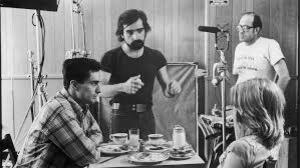Martin Scorsese (1973-1983)

In the early 1970s, Martin Scorsese emerged as one of the most important and daring filmmakers of his generation. Known for his raw storytelling, kinetic direction, and deeply personal exploration of morality, identity, and redemption, Scorsese’s work during this period reflects a filmmaker unafraid to probe the darkest corners of human nature with empathy and insight. This decade saw Scorsese collaborate with some of the era’s finest actors, most notably Robert De Niro, whose transformative performances became a hallmark of the director’s early career. Though not every project during this period was a commercial or critical triumph, the cumulative body of work solidified Scorsese’s reputation as a cinematic force capable of combining personal vision with innovative technique.
Mean Streets (1973) Mean Streets serves as Scorsese’s first major statement as a filmmaker, a gritty, semi-autobiographical portrait of life in New York’s Little Italy. The film centers on Charlie (Harvey Keitel), a small-time hood torn between his Catholic guilt and his aspirations for power, and Johnny Boy (Robert De Niro), his reckless, self-destructive friend. Scorsese’s direction is electric, blending handheld camerawork, a dynamic use of music, and an unflinching approach to violence to create a visceral, immersive experience. The film’s visual language—marked by sudden zooms, erratic cuts, and bold color palettes—would become a hallmark of Scorsese’s style. Mean Streets feels raw and immediate, brimming with energy and authenticity. While its narrative lacks the polish of Scorsese’s later works, the film’s emotional core and thematic concerns—guilt, loyalty, and the struggle for self-definition—lay the groundwork for his future masterpieces.
Taxi Driver (1976) Scorsese’s first masterpiece, Taxi Driver is a haunting exploration of urban alienation and moral decay. De Niro stars as Travis Bickle, a mentally unstable cab driver whose descent into madness is both horrifying and heartbreakingly human. Scorsese’s direction amplifies the film’s unsettling atmosphere, using New York City’s grimy streets as a mirror for Travis’s fractured psyche. Bernard Herrmann’s haunting score underscores the character’s growing detachment from reality, while Paul Schrader’s script paints a portrait of a man teetering on the edge of violence. The film’s climax—a bloody rampage in a brothel—is both cathartic and deeply unsettling, leaving audiences questioning the line between heroism and vigilantism. Scorsese’s handling of such morally ambiguous material is masterful, refusing to offer easy answers. Taxi Driver was a critical and commercial success, earning four Academy Award nominations and cementing Scorsese’s place as one of the most provocative filmmakers of his time.
New York, New York (1977) After the success of Taxi Driver, Scorsese took a surprising detour with New York, New York, a stylized homage to 1940s and 1950s Hollywood musicals. The film stars De Niro as a volatile saxophonist and Liza Minnelli as a rising singer, chronicling their tempestuous romance against the backdrop of the post-war music scene. While ambitious, the film struggles to balance its lavish, technicolor aesthetic with its emotionally raw narrative. De Niro and Minnelli deliver compelling performances, but the characters’ toxic relationship can be exhausting to watch, and the film’s tonal shifts often feel jarring. A commercial failure upon release, its bold experimentation and deeply personal nature make it a fascinating, if flawed, entry in Scorsese’s filmography.
Raging Bull (1980) One of Scorsese’s crowning achievements, Raging Bull is a brutal and unflinching biopic of boxer Jake LaMotta, played with astonishing intensity by De Niro. The film chronicles LaMotta’s rise and fall, capturing his physical prowess in the ring and his self-destructive tendencies outside it. The black-and-white cinematography by Michael Chapman lends the film a stark, timeless quality, while the meticulously choreographed boxing scenes transform violence into a kind of grotesque ballet. The juxtaposition of these kinetic sequences with LaMotta’s quieter moments of vulnerability creates a portrait of a deeply flawed, deeply human figure. De Niro’s performance is legendary, showcasing a level of physical and emotional commitment rarely seen in cinema. His portrayal of LaMotta’s rage, insecurity, and desperate need for redemption anchors the film, making it as emotionally devastating as it is visually stunning. Though it initially received a lukewarm box office response, Raging Bull has since been hailed as one of the greatest films of all time, a testament to Scorsese’s uncompromising vision.
The King of Comedy (1983) Scorsese’s most underrated film, The King of Comedy is a darkly comic exploration of fame, obsession, and the blurred lines between reality and delusion. De Niro stars as Rupert Pupkin, a delusional aspiring comedian who kidnaps a talk show host (Jerry Lewis) in a desperate bid for the spotlight. Scorsese’s direction is restrained yet incisive, allowing the film’s uncomfortable humor to emerge naturally from its characters and situations. De Niro’s performance is both hilarious and deeply unsettling, capturing Pupkin’s pathetic earnestness and unrelenting determination. Lewis, in a rare dramatic role, delivers a nuanced portrayal of a man caught in the crossfire of Pupkin’s delusions. The film’s themes—celebrity worship, the erosion of boundaries between public and private life, and the commodification of identity—feel even more prescient in today’s media-saturated culture. While The King of Comedy was not a commercial success upon release, it has since been reappraised as one of Scorsese’s sharpest and most daring works.
Overall Appraisal From 1973 to 1983, Martin Scorsese established himself as a filmmaker of unparalleled vision and range. His ability to tackle vastly different genres—from gritty crime dramas to musicals and psychological thrillers—while maintaining a consistent thematic focus on guilt, ambition, and redemption is a testament to his artistry. At his best, Scorsese delivers films that are both viscerally thrilling and emotionally profound. Taxi Driver and Raging Bull are towering achievements, blending technical innovation with deeply personal storytelling, while even his less successful efforts like New York, New York showcase a fearless commitment to experimentation and an unwillingness to compromise his artistic vision. The films of this period are not just remarkable achievements in their own right—they are the foundation of a career that continues to influence and inspire filmmakers around the world.
